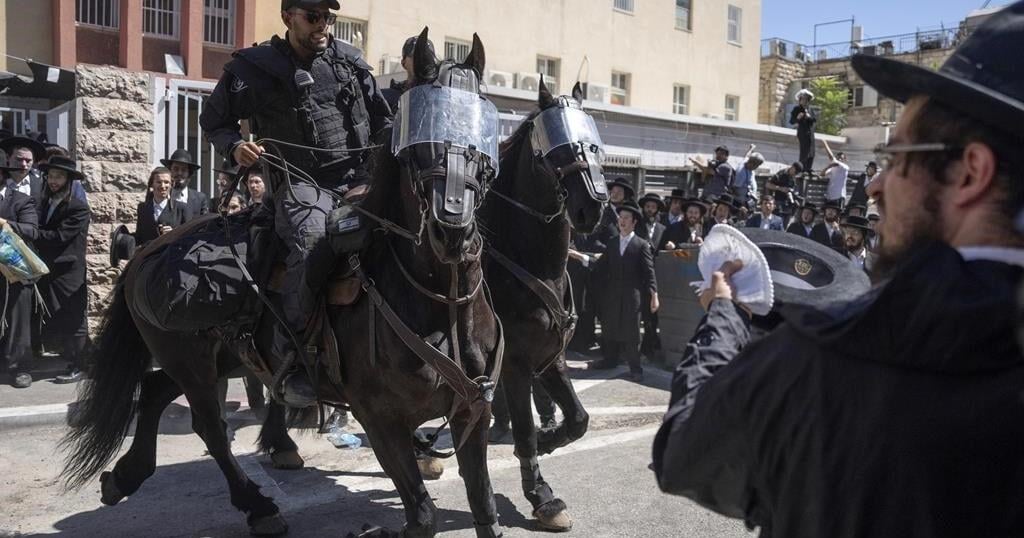CAIRO (AP) — Key mediator Egypt expressed skepticism Wednesday as more details emerged of the proposal meant to bridge gaps in cease-fire talks between Israel and Hamas, a day before negotiations were expected to resume in Cairo.
The challenges around the so-called bridging proposal appear to undermine the optimism for an imminent agreement that U.S. Secretary of State Antony Blinken carried into his latest Mideast visit this week.
Diplomatic efforts had redoubled as fears grow of a wider regional war after the recent targeted killings of leaders of the militant Hamas and Hezbollah groups, both blamed on Israel, and threats of retaliation.
Officials in Egypt, in its unique role as both a mediator and affected party since it borders Gaza, told The Associated Press that Hamas won’t agree to the bridging proposal for a number of reasons — ones in addition to the long-held wariness over whether a deal would truly remove Israel forces from Gaza and end the war.
One Egyptian official, with direct knowledge of the negotiations, said the bridging proposal requires the implementation of the deal’s first phase, which has Hamas releasing the most vulnerable civilian hostages captured in its Oct. 7 attack on Israel that sparked the war. Parties during the first phase would negotiate the second and third phases with no “guarantees” to Hamas from Israel or mediators.
“The Americans are offering promises, not guarantees,” the official said. “Hamas won’t accept this, because it virtually means Hamas will release the civilian hostages in return for a six-week pause of fighting with no guarantees for a negotiated permanent cease-fire.”
He also said the proposal doesn’t clearly say Israel will withdraw its forces from two strategic corridors in Gaza, the Philadelphi corridor alongside Gaza’s border with Egypt and the Netzarim east-west corridor across the territory. Israel offers to downsize its forces in the Philadelphi corridor, with “promises” to withdraw from the area, he said.
“This is not acceptable for us and of course for Hamas,” the Egyptian official said.
A second Egyptian official, briefed on the latest developments in negotiations, said there were few chances for a breakthrough since Israel refuses to commit to a complete withdrawal from Gaza in the deal’s second phase. The official said Israel also insists on keeping its forces in the Philadelphi corridor and having full control of the Netzarim corridor.
He also said Egypt told the United States and Israel that it won’t reopen the Rafah crossing into Gaza, a crucial entry point for humanitarian aid, without the complete withdrawal of Israeli forces from the Palestinian side and from the Philadelphi corridor — where Israel wants to prevent Hamas from replenishing its arsenal through smuggling tunnels.
Both Egyptian officials spoke on condition of anonymity to discuss the ongoing negotiations. Mediators are scheduled to meet on Thursday and Friday in Cairo for more talks on the proposal, before submitting it officially to Hamas.
Hamas political official Bassem Naim said Tuesday that the bridging proposal adopted several new demands from Israeli Prime Minister Benjamin Netanyahu, including that Israeli forces remain in Rafah, Philadelphi and Netzarim and search displaced Palestinians returning to northern Gaza. Israel has said the searches are necessary to find militants.
Naim said the proposal also includes unspecified changes to the exchange of hostages held in Gaza for Palestinians imprisoned in Israel and doesn’t guarantee that a cease-fire would remain in place during negotiations on the transition from the deal’s first phase to the second.
In previous versions of the cease-fire plan, the second phase would entail a permanent cease-fire, full withdrawal of Israeli forces from Gaza and the release of remaining male hostages, both civilians and soldiers.
Blinken after his meetings in Egypt and talks held in fellow mediator Qatar said the bridging proposal is “very clear on the schedule and the locations of (Israeli military) withdrawals from Gaza,” but no details on either have emerged.
Blinken also said that because Israel accepted the proposal, the focus turns to doing everything possible to “get Hamas on board.” Egypt’s state-run Al-Ahram daily reported that Blinken received a “clear Egyptian demand for the U.S. to work towards a well-framed deal with clear deadlines and clear objectives to encourage Hamas to sign.”
But there is skepticism, along with fatigue, among many in Israel about Netanyahu’s commitment to securing an agreement.
“As long as the entire group of professional negotiators believes that Netanyahu is scuttling a deal, there won’t be any confidence,” commentator Nadav Eyal wrote in daily newspaper Yedioth Ahronoth.
The war in Gaza, now in its 10th month, has caused widespread destruction and forced the vast majority of Gaza’s 2.3 million residents to flee their homes. Aid groups fear the outbreak of polio and other diseases.
The Oct. 7 attack by Hamas and other militants killed some 1,200 people in Israel, mostly civilians. Over 100 hostages were released during last year’s cease-fire. Hamas is still believed to be holding around 110 hostages. Israeli authorities estimate around a third are dead.
Six bodies of hostages were recovered this week in Gaza.
“In what world do families have to beg and cry for the return of their family members alive and murdered?” Esther Buchshtab, the mother of one, 35-year-old Yagev Buchshtab, asked at his funeral Wednesday.
Israel’s retaliatory offensive has killed over 40,000 Palestinians, according to Gaza’s Health Ministry, which does not distinguish between civilians and combatants in its count.
Also Wednesday, Netanyahu made his first visit to northern Israel since Israel’s killing of a top Hezbollah commander last month in Beirut, as focus returns to the increasing crossfire along Israel’s border with Lebanon.
“We are ready for every scenario, both defensive and offensive,” he said while meeting troops.
___
Associated Press writer Abby Sewell in Beirut contributed to this report.
___
Follow AP’s war coverage at

























